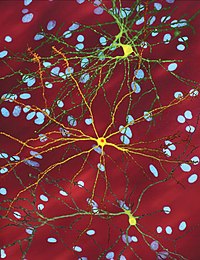
Photo from wikipedia
Background Autophagy is a conserved physiological intracellular mechanism responsible for the degradation and recycling of cytoplasmic constituents (e.g., damaged organelles, and protein aggregates) to maintain cell homeostasis. Aberrant autophagy has… Click to show full abstract
Background Autophagy is a conserved physiological intracellular mechanism responsible for the degradation and recycling of cytoplasmic constituents (e.g., damaged organelles, and protein aggregates) to maintain cell homeostasis. Aberrant autophagy has been observed in neurodegenerative diseases, including Alzheimer’s Disease (AD), Parkinson’s Disease (PD), Amyotrophic Lateral Sclerosis (ALS), and Huntington’s Disease (HD), and recently aberrant autophagy has been associated with mood disorders, such as depression. Several in vitro methods have been developed to study the complex and tightly regulated mechanisms of autophagy. In vitro methods applied to autophagy research are used to identify molecular key players involved in dysfunctional autophagy and to screen autophagy regulators with therapeutic applications in neurological diseases and mood disorders. Therefore, the aims of this narrative review are (1) to compile information on the cell-based methods used in autophagy research, (2) to discuss their application, and (3) to create a catalog of traditional and novel in vitro methods applied in neurodegenerative diseases and depression. Methods Pubmed and Google Scholar were used to retrieve relevant in vitro studies on autophagy mechanisms in neurological diseases and depression using a combination of search terms per mechanism and disease (e.g., “macroautophagy” and “Alzheimer’s disease”). A total of 37 studies were included (14 in PD, 8 in AD, 5 in ALS, 5 in %, and 5 in depression). Results A repertoire of traditional and novel approaches and techniques was compiled and discussed. The methods used in autophagy research focused on the mechanisms of macroautophagy, microautophagy, and chaperone-mediated autophagy. The in vitro tools presented in this review can be applied to explore pathophysiological mechanisms at a molecular level and to screen for potential therapeutic agents and their mechanism of action, which can be of great importance to understanding disease biology and potential therapeutic options in the context of neurodegenerative disorders and depression. Conclusion This is the first review to compile, discuss, and provide a catalog of traditional and novel in vitro models applied to neurodegenerative disorders and depression.
Journal Title: Frontiers in Molecular Neuroscience
Year Published: 2023
Link to full text (if available)
Share on Social Media: Sign Up to like & get
recommendations!